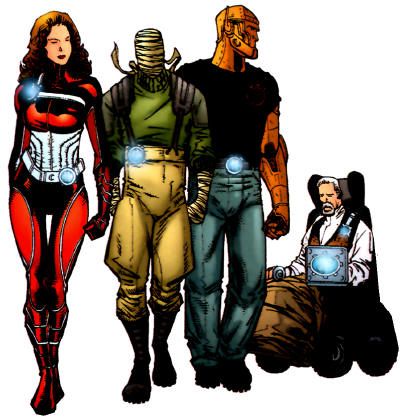
Deborah "Dusty" Marlow reported to Veronica Cale, Wonder Woman foe and president of Oolong Island. Cale noted Niles Caulder's cavalier use of lethal force with his Doom Patrol, his tendency to antagonize fellow (mad) scientists "on all manner of technical minutiae," and the probable need to teach the lesson that the team operated under her grace.
Dr. Wade Ackerman had reached out to the Doom Patrol for help with his black hole singularity problem, "all'a six hours since the last debacle." Robotman wanted a break, but the Chief explained, "The Justice League still tends to confuse purpose with jingoism. The Justice Society, if the Gog incident is any indication, has come to define gullibility. Checkmate is slowly choking itself to death with self-imposed red tape..."
Vulcan Supercollider: Brandenburg, Germany. Dr. Ackerman was confronted by the sentient singularity, which had taken to appearing on the faces of the many human beings it possessed. Ackerman became one such victim, to quell the singularity's curiosity as to why a super-team had been involved in negotiations. "Hm... Doom. Noun. Inevitable destruction or ruin. Patrol. Noun. A unit sent out on a reconnaissance or combat mission. Oxymoron. Noun. A rhetorical figure in which contradictory terms are combined. Fascinating."
Father Rocky Davis inquired about Karen Beecher's marriage and adaptation to her condition. Karen explained that she and her ex-husband, Mal "Hornblower" Duncan, "made a good run of it. It just got to the point where the good times were being outweighed by the bad times. It happens." Roommate Rita Farr's atypical reaction to Nudge's death also came up.
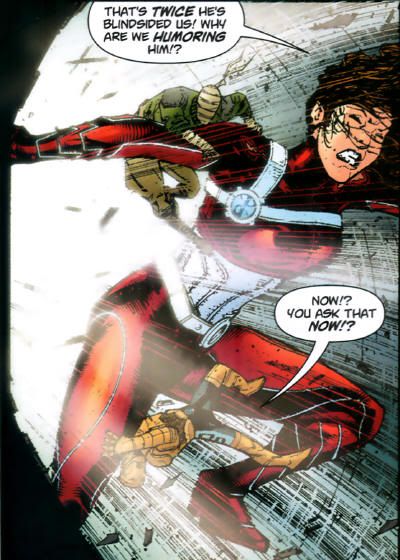
The Doom Patrol tried to sneak up to the location of the Vulcan Supercollider, but they were immediately detected, and found "Fascinating." The singularity saw itself as an explorer and scientist, "slave to my curiosity." To that end, the singularity repeatedly attacked the team to observe their reactions, while dodging questions about its own nature and intentions. Ultimately, the singularity was constructing its own personal encyclopedia of existence, and it would only need to possess (and by extension burn out) a few million humans to get a good feel for Earth...
"Black Is (Theoretically) Black" was by Keith Giffen, Matthew Clark and Livesay. This issue wasn't as willfully obtuse or laden with infoblurbs as the last, but you can still see why Giffen has trouble connecting with mainstream audiences. This book reminds me especially of Justice League Europe with its emphasis on high stakes action undercut by sardonic comedy. Also like early JLE, Giffen has got to be laying the book out without credit. The body language, panel composition, and especially a host of characters with black blobs instead of facial features are all trademarks of his. Clark definitely adds pizzazz though, and I think he's going to make a name for himself now that he's left DC (who neglected to even mention his participation while launching this book.) I especially like his take on Elasti-Girl as the physical powerhouse of the team without looking like a steroid casualty. She's clearly feminine without having to run around in a mini-skirt, and looks ready for business in red leather. Larry and Cliff are comparatively interchangeable, from smart ass to crab ass.
Brave New World
- Breach #2 (April, 2005) @ Power of the Atom
- Wonder Woman #2 (September, 2006) @ Diana Prince
- Aquaman: Sword of Atlantis #42 (July, 2006) @ Justice League Detroit
- Martian Manhunter #2 (November, 2006) @ The Idol-Head of Diabolu
- The All New Atom #2 @ The Tiny Titan


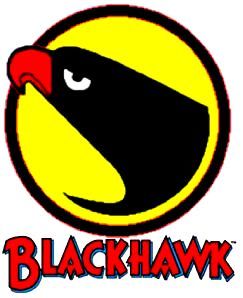






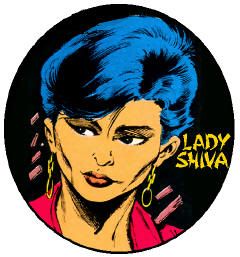
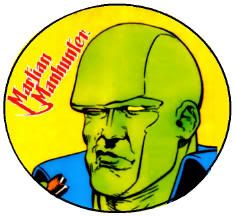






2 comments:
I find it sad that Giffen doesn't go over better with the greater public, because Doom Patrol strikes me has his best balance yet of action, characterization, continuity and independence from continuity. All these factors make this a quality superhero book in my opinion. Ah, the world.
I tried replying hours ago, but Blogspot was dopey and ate it. I was saying that I've been a Giffen supporter for most of my reading life, but he's also one of the most frustrating creators I've read. Too often, by the time he actually establishes his characters and the basics of a series, it gets cancelled. Truth is, I usually lose patience before that point.
With Doom Patrol here, my appreciation started to kick in around #3. I feel Giffen really took advantage of the Blackest Night tie-ins to bring up character conflicts and offer needed exposition. I especially liked the Negative Man issue, as someone who had only grazed Morrison's DP, or really anyone else's. I really dug how Giffen managed to tie together so much disparate continuity in a way that I as a relative layperson could understand and enjoy. I also think his and Matthew Clark's take on Rita Farr is great, and has made me a bit of a fan of her specifically.
Post a Comment